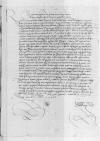Reverendis in Christo Patribus, dominis ⌊Maurici superinscribed, in the hand of other⌈ii superinscribed, in the hand of other⌉o⌋, ⌊Ioanni⌋ Culmensi episcopis, necnon Magnificis et Generosis ⌊Ioanni de Lusianis⌋ Culmensi et capitaneo Radzinensi, ⌊Georgio de Baisen⌋ Mariemburgensi et Capitaneo Gnevensi, ⌊Georgio de Conopathi⌋ Pomeraniae palatinis et capitaneo Suecensi, ⌊Nicolao de Dzialin⌋ Culmensi et capitaneo Brodnicensi, ⌊Ludovico de Mortangen⌋ Elbingensi et ⌊Achatio Czeme⌋ Gedanensi castellanis et capitaneo Stumensi, sinicere et fidelibus dilectis gratiam nostram regiam
Reverendi in Christo Patres necnon Magnifici et Generosi sincere et fideles dilecti.
Ante bellum novissime in ⌊terrris istis Prussiae⌋ gestum cum olim Sebastianus a Loden insimulatus fuisset, tamquam praedonibus et maleficis, qui ex terra ordinis grassabantur subditisque nostris caedes et plurima damna inferebant, receptum praebuisset, donavimus censum illius, quem habuit in ⌊civitate nostra Elbigensi⌋, famato olim Michaeli Brackwagen, civi eiusdem civitatis Elbingensis, in cuius usu et possesione est hactenus civis eiusdem civitatis Elbingensis nomine Casperus Damnicz vigore eiusmodi donationis per nos sibi factae.
Quia vero illustris princeps dominus ⌊Albertus⌋ marchio Brandeburgensis et in Prussia dux egit apud nos et antea saepius, et novissime per oratorem suum generosum Georgium de Cunheym capitaneum in ⌊Tapiaw⌋, ut subditum suae illustritatis Casperum ab Aulach, cui uxor, relicta Sebastiani praefati demortui, nupsit, in ius recipiendi census praedicti restitueremus, asserens praenominatum olim Sebastianum iure non convictum de his, pro quibus erat insimulatus, ab eodem alienatum esse, nos, tametsi non teneamus memoria, si prius vel posteaquam or postquam⌈posteaquam ms. postequam(!)
⌈posteaquamposteaquam ms. postequam(!)
⌉posteaquam or postquam⌉ applicaveramus Michaeli Brackwagen censum praefatum, Sebastianus a Loden fuerat convictus de eo crimine, cuius accusabatur, necne quandoquidem res haec sit antiquata et iam pridem facta, ne tamen postulationi praefati ⌊domini ducis⌋ deesse et iniuriam alicui fieri velle videamur, vobis
committen(tes) or committen(do)⌈committen(tes)committen(tes) or committen(do)⌉ duximus committimusque praesentibus mandantes, quatenus in proxima ⌊conventione terrarum istarum⌋ vocato ad se succesore memorati Brackwagen nomine Casparo Dannicz et auditis partium propositionibus et responsis visisque litteris nostris super donato per nos censu praedicto editis, et pervestigato, ex qua causa is ipse census a praefato Sebastiano fuerit alienatus, id, quod iustum vobis videbitur, in utramque partem decernatis, unius vel duorum ex vobis absentia non obstante, faciatisque id, quod decreveritis in praemissis, a partibus hincinde firmiter observari, pro gratia nostra facturi.
Commissio propria sacrae regiae maiestatis

 BNW, BOZ, 953, f. 117r
BNW, BOZ, 953, f. 117r